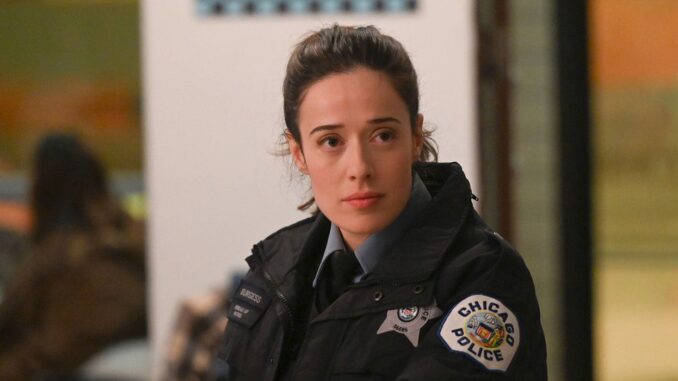
The hallowed, often grimy, streets of Chicago P.D.'s District 21 are no stranger to a certain kind of grit. For twelve seasons, audiences have watched Intelligence navigate the moral quagmire of urban policing, where lines blur and the law often takes a backseat to a desperate need for justice. As the city braces for Season 13, the announcement of Officer Eva Imani, a new face with a military background, isn't just a casting choice; it's a strategic narrative deployment, promising to inject a potent new dynamic into an already explosive mix. Imani's arrival won't merely be an addition; it will be a catalyst, a mirror reflecting the squad's own methods, and a fresh lens through which to explore the enduring themes of duty, loyalty, and the scars of service.
From the moment she steps into the squad room, Imani's military bearing will likely be palpable. It’s not just a posture; it's an ethos. Picture her in a bustling scene, perhaps a chaotic briefing led by Voight. While others might fidget, interrupt, or offer their immediate, instinctual takes, Imani would be a still point in the storm. Her eyes, sharp and assessing, would absorb every detail, her expression unreadable. She wouldn't be quick to speak, but when she does, her words would carry the weight of concise, mission-oriented thought. This isn't the impulsive, street-forged bravery of a Ruzek or the simmering intensity of an Upton; it’s a calculated, disciplined courage, honed in environments where adherence to protocol can mean the difference between life and death. Her uniform, even civilian clothes, might subtly reflect this – a crispness, a lack of unnecessary adornment, a readiness for deployment. This initial quiet intensity will immediately set her apart, establishing her as an observer rather than a participant in the team's established rhythm, challenging their often-freewheeling approach with a disciplined precision.
This military precision will inevitably clash with the fluid, often rule-bending tactics of Intelligence. Imagine a high-stakes scenario: a suspect barricaded, hostages involved. While Voight might be barking orders to breach or deploy an unorthodox maneuver, Imani’s mind would likely run a rapid series of tactical assessments. Her suggestions wouldn't be born of instinct alone, but from documented procedures, risk analyses, and an understanding of engagement rules that transcend the street-level dynamic. She might advocate for a more contained, less volatile approach, potentially putting her at odds with Voight’s "do whatever it takes" philosophy. We can envision a scene where her direct, almost blunt questions about warrants or legal boundaries briefly stall an operation, not out of insubordination, but from a deeply ingrained understanding of the chain of command and the consequences of overstepping it. This isn't just about friction; it's about the show exploring the validity of different forms of authority and the tension between military discipline and street justice.
Beyond the initial friction, however, Imani's military background offers an unparalleled skillset that will prove invaluable. Envision a complex surveillance operation where the target is elusive and the terrain challenging. While others might rely on their street smarts, Imani would bring a mastery of reconnaissance, pattern recognition, and perhaps even advanced technological proficiency – skills honed in environments far more hostile than the city grid. In a tense standoff, her ability to remain calm under extreme pressure, to assess threats with clinical detachment, and to execute tactical maneuvers with flawless precision would be her superpower. We could see her taking point in a dangerous entry, her movements economical and silent, her weapon handling fluid and practiced. It's not just her physical prowess; it’s the mental fortitude, the capacity for extreme focus that allows her to operate in the grayest areas with unwavering resolve, an unflappable presence that can steady even the most volatile situation.
But Imani’s impact runs deeper than tactical advantage. Her military past would undoubtedly carry its own baggage, its own forms of trauma that might resonate profoundly with the existing members of Intelligence. The "ghosts of missions past" – echoes of combat, loss, and difficult choices made under impossible circumstances – would find a grim kinship with the haunted eyes of a Hailey Upton or the quiet stoicism of Kevin Atwater, both of whom have faced their own battles for justice and identity. A quiet scene could depict Imani and another squad member, perhaps over a late-night coffee, sharing fragmented experiences that, while different in context, are identical in their emotional weight: the burden of duty, the cost of protection, the weight of a life saved or lost. This shared language of sacrifice would forge bonds, transforming initial skepticism into a deep, unspoken understanding. Imani would not just be a cop; she would be a fellow warrior, albeit from a different theater of operations, seeking to adapt her warrior's code to the concrete jungle of Chicago.
In Officer Eva Imani, Chicago P.D. Season 13 isn't just introducing a new character; it's inviting an evolution. Her military background will not merely be a biographical detail but a foundational element of her character, driving her actions, shaping her worldview, and ultimately challenging the very fabric of Intelligence. She will force them to re-evaluate their methods, appreciate new forms of discipline, and confront the universal scars of service. As she navigates the volatile streets, her journey will be a testament to the enduring human spirit, a narrative that explores how different forms of training and trauma converge in the singular pursuit of justice, ensuring that Season 13 of Chicago P.D. is not just another chapter, but a profound new deployment.
